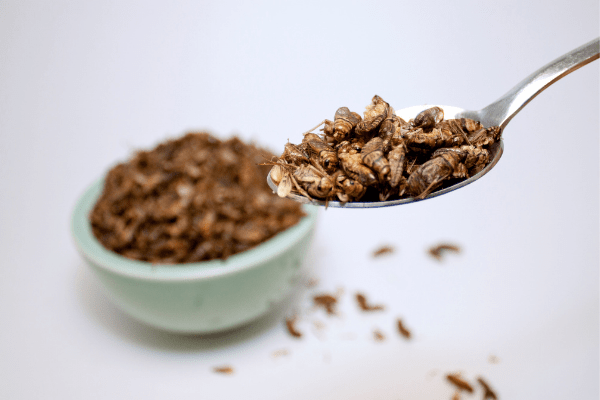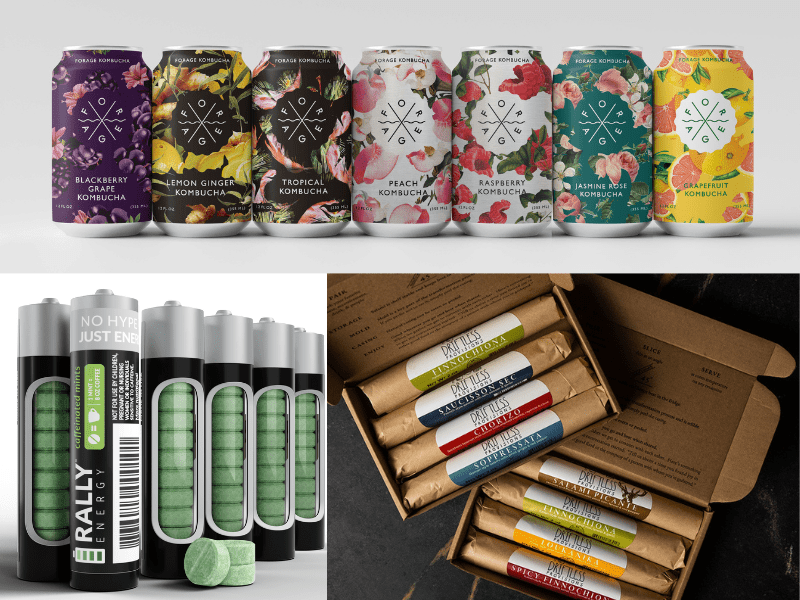As a global community, we have two monumental, interrelated problems pressing down on us: One, how can we arrest manmade climate change before it’s too late? We are experiencing its ramifications more each year, in the form of severe drought, wildfires, floods and other more frequent and catastrophic weather events.
Two, with 1 billion people already chronically hungry and the global population growing rapidly, how on earth are we going to feed everyone? The United Nations predicts the planet will host 9 billion people by 2050, meaning current food production will need to nearly double. However, land is already scarce, and to keep expanding agriculture acreage just isn’t sustainable. Plus, climate change–related water shortages are already making it difficult to support today’s level of food production. Our oceans are overfished too.
To solve for both of these issues, experts say we need to radically transform how we produce and consume food. Effective solutions include reducing our reliance on meat, switching from energy-intensive cattle to poultry and other less-energy-intensive animals, or seeking out alternative protein sources. We’re already seeing these shifts happen with the growing popularity of plant-based diets and rapid proliferation of plant-based meat and dairy alternatives.
But what if we looked beyond plants … to insects?
In 2013, the United Nations Food and Agriculture Organization released a groundbreaking report making the case for humans consuming more insects. There are roughly 2,000 known edible insect species, hundreds of which are already part of the diet of 2 billion people worldwide, including beetles, crickets, fleas, ants, wasps, worms, bees and butterflies. It’s mainly just the U.S. and other Western nations that say “ew” at the idea of ingesting bugs.
But there are several compelling reasons why we should buck up and incorporate more insects into our daily diets. Nutritionally, many species are chockful of protein, fiber, essential vitamins and minerals, and healthy fats such as omega-3s. And from an ecological perspective, raising and harvesting insects requires just a fraction of the land and water needed to rear cows, pigs and sheep. Insects also convert food into protein much more efficiently than livestock.
Additionally, according to the FAO report, insects can help reduce environmental contamination, emitting fewer greenhouse gases and less ammonia than cattle or pigs. They also likely pose less risk of transmitting zoonotic infections to humans, livestock and wildlife. Also, raising and harvesting insects can be very low-tech and therefore provide solid economic and livelihood-improvement opportunities for people everywhere, including in developing nations.
Insects aren’t just beneficial for human consumption, either. They can also become nutritious feed for livestock and other animals. Tera’s latest podcast guest, Kevin Bachhubber, founder of Madison Cricket Farm and Bachhuber Consulting, raises crickets for animal feed, predominately pet food. He discusses the amazing potential of insect farming—sustainably and nutritionally speaking, but also as a solid entrepreneurial venture.
Of course, there are some roadblocks to broader acceptance of insects as food. The regulatory environment is still murky, and best practices and quality assurances still need ironing out. Also, much more research is needed around optimizing the nutritional content, production and commercialization of insect protein. Several universities are now studying these issues, some in partnership with industry. For example, here at the University of Wisconsin, Madison, there is a collaborative research project called MIGHTi, short for the Mission to Improve Global Health Through Insects. And Texas A&M just launched the Center for Environmental Sustainability Through Insect Farming.
But perhaps the biggest challenge is helping Americans get over the ick factor, which they are starting to do, albeit slowly. This is where business opportunities lie for food entrepreneurs. Most consumers aren’t ready to gobble dried beetles or crickets, but many will respond to innovative packaged foods made with insect proteins, especially now that more are thinking about the environmental and social impacts of their food choices.
We’ve already seen some of these products, such as cricket energy bars, mealworm larvae sausages or termite pastas, some faring better on the market than others. But there are still boundless opportunities for entrepreneurs to explore—and to potentially do well by doing good.

Inspired by the 2013 UN report on insect consumption, Kevin Bachhuber has devoted his career to insect agriculture and related systems. He started as a cricket farmer, then became a consultant, and now he’s back to raising bugs for animal feed with Madison Cricket Farm. Kevin tells Tera all about this exciting industry, including its sustainability benefits and moneymaking possibilities, so be sure to tune in!
And now, our roundup of the best food and beverage finance news, events and resources from around the web…
Business Model Insights
- 11 ways to make the hiring process more inclusive (New Hope Network)
Creating opportunities for diversity, equity and inclusion as you screen candidates takes an intentional, concentrated effort, but it’s worth it. - 7 ways to promote supply chain diversity (Food & Beverage Insider)
- How to embrace corporate social responsibility as an essential part of your business (New Hope Network)
Raising Capital
- Insect protein has investors intrigued (The Food Institute)
New report predicts that the demand for insect protein could reach half a million metric tons by 2030, up significantly from today’s market—and plenty of investors are interested. - Farm Credit’s commitment to young, beginning and small farmers grew in 2020 (The Fence Post)
- Do this or don’t bother when raising money (New Hope Network)
CPG/National Brands
- Addressing conflicting consumer demands: Ask yourself, ‘Why should my brand exist?’ (FoodNavigator-USA)
Should the food industry always yield to consumer demands, especially when those demands conflict with other values, such as sustainability and environmental impact? - Progress report: Brands face increasing pressure on recyclability claims in 2021 (Food Dive)
- What the natural product industry can do to combat health disparities in BIPOC communities (Nutrition Business Journal)

Market Trends
- Foodservice demand cuts retail produce sales below 2020 levels (Produce Blue Book)
The battle for the food dollar is intensifying as shoppers are ramping up their engagement with restaurants. - As on-the-go eating returns, consumers still prefer a real meal (Food Dive)
- How high can prices go: Top consumer foods (The Food Institute)

Farming and AgTech
- Agri-Business Corporations Are Trying to Save The Environment. Or Are They? (Modern Farmer)
How can you tell which agriculture projects are advancing sustainability and which are greenwashing? The lines are blurry and getting blurrier. - USDA accepting applications to help cover costs for organic certification (The Fence Post)
- Making the ecological and nutritional case for beef (GreenBiz)
Deals/M&A
- Zevia the latest in a hot season of industry IPOs, private equity investment (New Hope Network)
“As the healthy food industry emerges from one of the most challenging times in its history, investment in the natural and specialty foods channel is surging, including private equity and public offerings.” - Apeel Raises $250 Million to Accelerate Its Fight Against Food Waste (The Spoon)
- Sanderson Farms to be acquired by Cargill and Continental Grain for $4.53B (Food Dive)

Industry Events
Virtual events:
- FFI Fellows Program Informational Webinar: 8/31
- FFI Raising Equity Workshop: 9/21–9/23
- Natural Products Expo East Virtual Extension: 9/22–9/25
- FoodNavigator Climate Smart Food Digital Summit: 9/27–9/30
- Edible-Alpha® Immersion Training: Building a Brand that Stands Out with Katie Mleziva: 9/28–9/30
- FFI Quarterly Trends Talk: 8/4
- Food and Beverage 2021 Global Symposium: 10/5
- Food Safety Consortium Virtual Conference Series: Thursdays 10/7–11/4
- Food & Nutrition Conference & Expo: 10/16–10/19
- American Food Manufacturing Summit: 11/16–11/18
In-person events:
- Farm Progress Show: 8/31–9/2 in Decatur, IL
- Food Automation and Manufacturing Conference and Expo: 9/12–9/15 in Miami, FL
- Organic Produce Summit: 9/15–9/16 in Monterey, CA
- International Baking Industry Exposition: 9/17–9/21 in Las Vegas, NV
- Americas Food & Beverage Show: 9/22–9/23 in Miami Beach, FL
- Natural Products Expo East: 9/22–9/25 in Philadelphia, PA
- Fancy Food Show 2021: 9/27–9/29 in New York, NY
- World Dairy Expo: 9/28–10/2 in Madison, WI
- National Value Added Agriculture Conference: 10/17–19 in Dallas/Fort Worth, TX
- SupplySide West/Food ingredients North America: 10/25–10/28 in Las Vegas, NV
- Soil Health Academy: Transitional Regenerative Dairying: 10/26–10/28 in Loganton, PA
- IBIEducate 2021: 10/26–10/28 in Kansas City, MO
- PMA Fresh Summit: 10/28–10/30 in New Orleans, LA
- Poultry Tech Summit: 10/31–11/2 in Atlanta, GA
- Process Expo: 11/2–11/5 in Chicago, IL
- Digital Food & Beverage: 11/10–11/12 in Austin, TX
- Sustainable Agriculture Conference: 11/13–11/15 in Durham, NC





